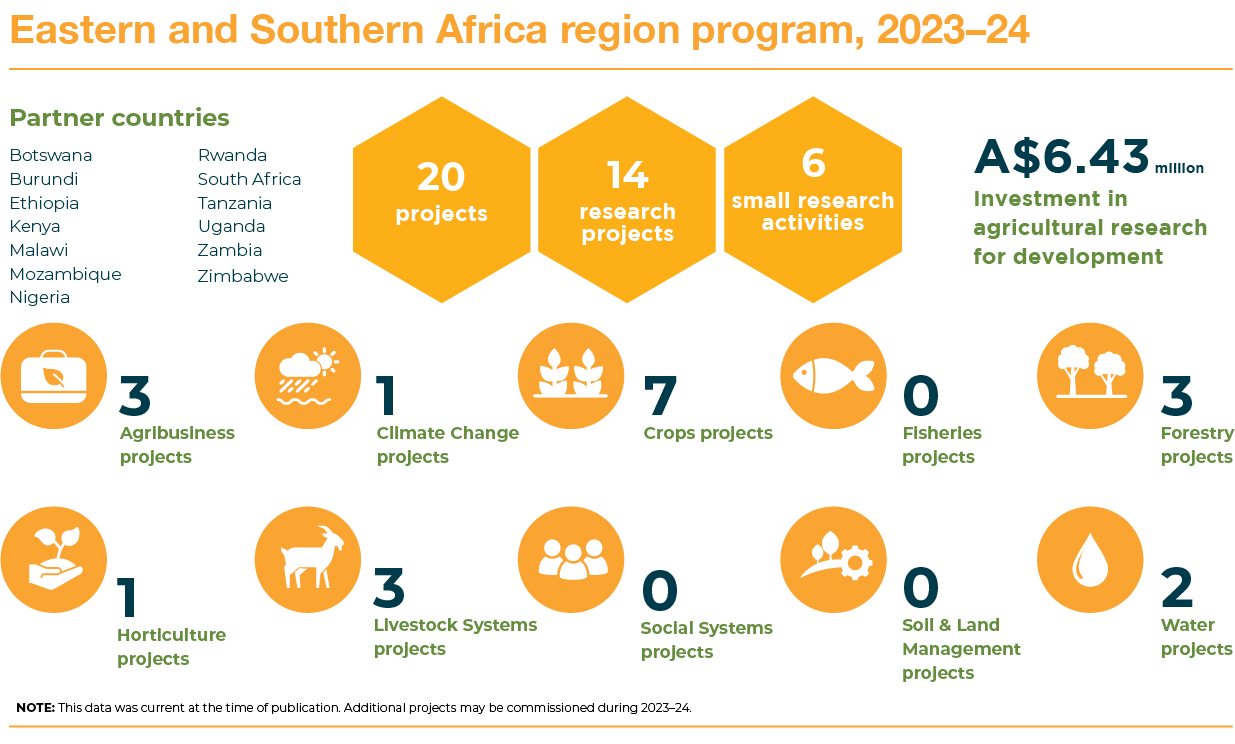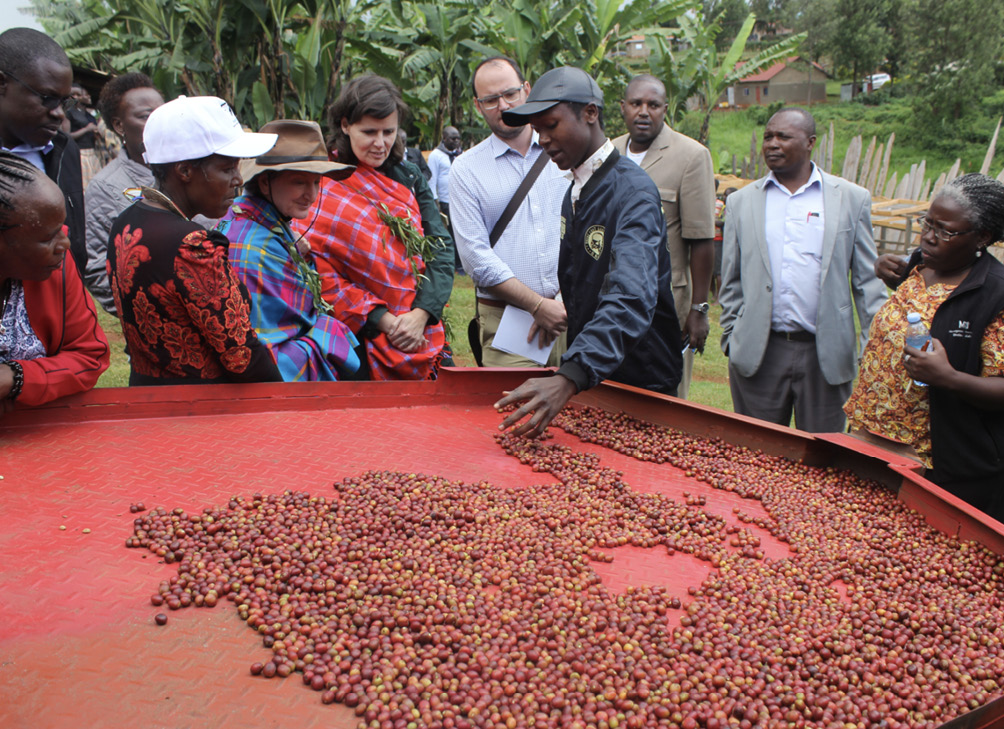Although the economic performance of the African region has been strong for several years, estimates show that average growth of GDP slowed to 3.8% in 2022, from 4.8% in 2021, amid significant challenges following the COVID-19 pandemic and the Russian invasion of Ukraine.
Growth across Sub-Saharan Africa is slowed by current uncertainty in the global economy, the underperformance of the continent’s largest economies, high inflation and a sharp deceleration of investment growth. Growth is expected to slow to 3.1% in 2023, given soaring food and energy prices, tightening global financial conditions and the associated increase in domestic debt service costs. These events have been felt acutely across Africa, where food insecurity and malnutrition have been persistent problems for decades.
Population growth and economic transformation are putting increasing pressure on the agricultural ecosystem, and climate change continues to exacerbate these challenges. To achieve a true transformation of food systems in Africa, there is a growing recognition that food systems should be thought about differently, taking into account the true value and full cost involved in growing, distributing and consuming food. This is vital not only for the food security of hundreds of millions of Africans but also for African economies and sustainable development on the continent.
Despite its incredible diversity at a macro level, Africa has a greater proportion of poor people on average than any other region in the world. The region is characterised by high levels of food insecurity and very low Human Development Index rankings. If the current trend continues, Africa is unlikely to meet the United Nations Sustainable Development Goals, including Goal 1 of eradicating extreme poverty by 2030.
Africa’s urban population has been growing at a very high rate and is projected to reach 56% of the total population (currently 44% of 1.34 billion) by 2050. Africa’s demand for food is expected to more than double by that time, driven by population growth, rising incomes, rapid urbanisation, changes in national diets towards greater consumption of higher-value fresh and processed foods, and more open intra-regional trade policies. This is compounded by impacts associated with climate change, which continue to hamper agricultural production, productivity and reliability and increase the demand for land and water. In addition, rural demographics continue to change. Rural populations are ageing, many farms are getting smaller, and rural youth are looking for more lucrative livelihoods in urban areas rather than in traditional farming.
These changes are helping to create new opportunities for Africa’s smallholder farmers. Their small farms are transforming into business operations, which in turn bring new challenges to the agricultural systems.
Agriculture typically accounts for 30–40% of the GDP of African countries and more than 70% of the continent’s poor live in rural areas. While agriculture remains a key driver of the economic growth that is required to deliver economic transformation for the rural poor, growth in productivity and production have broadly stagnated in the past decade. Unlocking the potential of Africa’s agricultural and food systems requires substantial investment in the agriculture sector and in research to provide the knowledge that underpins growth in agricultural productivity, especially for commercialising smallholder farming.
Drivers of regional collaboration
The Comprehensive Africa Agriculture Development Programme (CAADP) of the African Union, in collaboration with the Regional Economic Communities, has been at the helm of mobilising the interest and commitment of African member states and their stakeholders for the transformation of the African agriculture sector.
A major milestone was the adoption of the 2014 Malabo Declaration on Accelerated African Agricultural Growth and Transformation for Shared Prosperity and Improved Livelihoods, in which the heads of states agreed to spend a minimum of 10% of their total expenditure on agriculture and pursue a target of 6% annual growth. Subsequently, the leaders noted the need for monitoring, tracking and reporting on the implementation of the declaration using the CAADP Results Framework.
The African Union introduced a biannual review, the Africa Agriculture Transformation Scorecard, which tracks and reports each country’s progress towards achieving the goals and targets of the Malabo Declaration. This important mechanism ensures that there is political will, backed by appropriate actions, to achieve agricultural growth and transformation in Africa.
The scorecard is presented at the African Green Revolution Forum, a key annual pan-African forum with the goal of accelerating progress on agriculture’s contribution to economic growth and transformation, in line with delivering on the Malabo commitments. The forum has become a premier platform for leaders from across Africa and around the world to advance concrete action plans and share knowledge to tap the enormous potential of agriculture in driving equitable and sustainable economic growth across the continent. The Alliance for a Green Revolution in Africa, in collaboration with several investors, coordinates the forum and produces a report on the forum, the Africa Agriculture Status Report.
Regional collaboration is crucial to achieving economic development in Africa, and the role of regional and sub-regional organisations is key, including the promotion and protection of foreign investment. ACIAR is closely linked to the main regional agencies, including the Forum for Agricultural Research in Africa, the African Union Development Agency–New partnership for Africa Development, and the Forum for Agricultural Research in Africa, which are important knowledge brokers and sources of priorities for the region.
ACIAR also liaises with sub-regional organisations, which are important strategic partners and play a key role in enhancing our impact to a regional scale, especially the Association for Strengthening Agricultural Research in Eastern and Central Africa and the Food, Agriculture, and Natural Resources Policy Analysis Network.
A good source for calibrating our regional priorities comes from the annual African Green Revolution Forum, which aims to advance concrete action plans and share knowledge to tap into the enormous potential of agriculture in driving equitable and sustainable economic growth across the continent.
Regional ACIAR program
The agricultural environments of eastern and southern Africa and northern Australia have much in common – the wet tropics of Rwanda with northern Queensland, the semi-arid tropics of eastern Africa with central Queensland, and the arid rangelands of Ethiopia and southern Africa with the Northern Territory.
Australian agricultural science has expertise that is directly relevant to the African context. For more than 3 decades, ACIAR has supported projects that mobilised this expertise to deliver sustainable development outcomes in the region. The free-market orientation and effective architecture of agricultural research in Australia are also relevant to African agricultural transformation.
The ACIAR program with eastern and southern Africa fills a niche not addressed by many donors: agricultural research for development. Our work is highly regarded and remains as relevant now as it was 30 years ago because of our research-for-development focus, ability to enable projects with a trans-disciplinary and cross institutional approach, the similarities of the agricultural environments between Australia and eastern and southern Africa, synergies built with Australia’s world-class teaching and research institutions that advance African agriculture and our long-term commitment to address specific constraints in agricultural production, with multi-year projects.
ACIAR currently invests 10% of our annual research budget in the Eastern and Southern Africa regional program and directly funds projects in partnership with 11 African countries. However, our footprint is much broader because of our contribution to CGIAR, which has 4 centres located in Africa and, until recently, spent half of its total budget in Africa. ACIAR also provides funding for other international agricultural research centres working in Africa, such as CABI, WorldVeg and icipe.
Our program is delivered primarily through bilateral country research partnerships (linked to regional impact pathways) and regional collaborations coordinated with sub-regional organisations. We also have a strong element of engagement through CGIAR. The portfolio of projects covers a diverse range of priorities, guided by the recommendations of the regional research coordination bodies that we collaborate with.
We also have a substantial collaboration with Canada’s International Development Research Centre through 2 programs: Cultivate Africa’s Future Fund (CultiAF) that is focused on Africa, and the Food Loss Research Program that has a global reach with 2 of its projects being implemented in Africa. The CultiAF2 program ends in 2023 and the 2 agencies are discussing options for the future. The program supported 9 projects across 7 countries, and was a highly regarded and unique program within Africa.
Current and proposed projects in the Eastern and Southern Africa region, 2023–24
| Program | Project title & code | Country |
|---|
| Agribusiness |
| | Mradi wa kuimarisha kilimo-biashara kwale AGB/2021/123 | Kenya |
| Managing food value chains for improved nutrition for urban vulnerable populations in Lusaka City (Zambia) (AfricitiesFood) CS/2020/210 | Zambia |
| Managing food value chains for improved nutrition for urban vulnerable populations in Mzuzu city (Malawi) (AfricitiesFood) CS/2021/115 | Malawi |
| Climate Change |
| | Regreening for the future: integrating climate change adpation pathways into community-led regreening in eastern Africa CLIM/2022/140 | Kenya |
| Crops |
| | Faba bean in Ethiopia: mitigating disease constraints to improve productivity and sustainability CIM/2017/030 | Ethiopia |
| Rapid breeding for reduced cooking time and enhanced nutritional quality in common bean (Phaseolus vulgaris) CROP/2018/132 | Burundi, Ethiopia, Kenya, Rwanda, Tanzania, Uganda |
| International Mungbean Improvement Network 2 CROP/2019/144 | Bangladesh, India, Indonesia, Kenya |
| Protecting Ethiopian lentil crops CROP/2020/164 | Ethiopia |
| Accelerating genetic gain in wheat through hybrid breeding in Bangladesh, Ethiopia and Pakistan CROP/2020/167 | Bangladesh, Ethiopia, Pakistan |
| Village-based biological control of fall armyworm in Zambia CROP/2022/112 | Zambia |
| Adoption of conservation agriculture practices in selected sites in Uganda: drivers, constraints and obstacles CROP/2022/186 | Uganda |
| Forestry |
| | Growing the future: better restoration in Uganda FST/2021/147 | Uganda |
| Fruit trees for climate adaption and mitigation in eastern Africa FST/2021/163 | Kenya |
| Management of pests and diseases of forest crops in Ethiopia FST/2022/122 | Ethiopia |
| Horticulture |
| | Developing a biosecurity system for small banana growers resilient to Fusarium wilt TR4 in southern and eastern Africa HORT/2020/128 | Mozambique, South Africa, Tanzania |
| Livestock Systems |
| | Strengthening adaptive capacity of extensive livestock systems for food and nutrition security and low-emissions development in eastern and southern Africa LS/2020/152 | Ethiopia, Kenya, Zimbabwe |
| Upscaling the benefits of insect-based animal feed technologies for sustainable agricultural intensification in Africa (ProteinAfrica) LS/2020/154 | Kenya, Rwanda, Uganda |
| Operationalising a global animal health governance network for policy impact LS/2022/143 | Bangladesh, Kenya, Philippines, Vietnam |
| Water |
| | Circular food systems in Africa WAC/2023/111 | Mozambique, Tanzania, Zimbabwe |
| Information for agriculture, food and water security – Digital Earth Africa WAC/2021/164 | Botswana, Ethiopia, Kenya, Rwanda, South Africa, Uganda |


